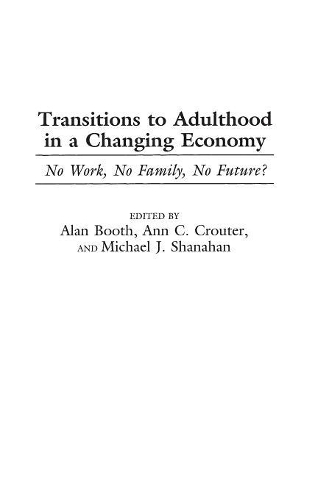
Transitions to Adulthood in a Changing Economy: No Work, No Family, No Future
(Hardback)
Publishing Details
Transitions to Adulthood in a Changing Economy: No Work, No Family, No Future
By (Author) Alan Booth
By (author) Ann C. Crouter
By (author) Michael J. Shanahan
Bloomsbury Publishing PLC
Praeger Publishers Inc
30th March 1999
United States
Classifications
Tertiary Education
Non Fiction
Age groups: children
Sociology: family, kinship and relationships
Sociology: work and labour
305.2350973
Physical Properties
Hardback
296
Description
In recent years the factors influencing young people's transition to adulthood have become much more problematic. This edited collection of papers from Pennsylvania State University's fifth annual Family Symposium explores the main issues involved in this transition, such as the widening gap between rich and poor, downsizing, global competition, and technological change. These factors have made jobs scarce in many areas, especially inner cities, and have profoundly affected family formation, making cohabitation, delays in marriage and parenthood, and prolonged residence with parents, the life choices of many young adults. These and other issues are explored by scholars from a wide variety of disciplines, who focus on four main questions: alterations in the structure of opportunity, prior experiences in the family, prior experiences in the workplace, and career development and marriage formation.
Reviews
Scholars interested in adolescence and the transition to adulthood, work and family, ethnicity, and policy will find this book a stimulating read. Both junior and senior researchers will find good models of life course analysis. Some chapters may be suitable for advanced undergraduates. Consistent with the life course perspective's sensitivity to context, the publication of this book is timely, given media coverage of declining family values, adult children rebounding home, McJobs, and the Generation-X workforce.-Contemporary Sociology
This book is a welcome addition to the literature and represents an essential tool for researchers interested in the subject of contemporary transitions to adulthood. Moreover, because the authors represent a wide variety of perspectives, the book will appeal to scholars from a range of disciplines, such as sociology, psychology, family studies, and social demography.-Journal of Marriage and the Family
"This book is a welcome addition to the literature and represents an essential tool for researchers interested in the subject of contemporary transitions to adulthood. Moreover, because the authors represent a wide variety of perspectives, the book will appeal to scholars from a range of disciplines, such as sociology, psychology, family studies, and social demography."-Journal of Marriage and the Family
"Scholars interested in adolescence and the transition to adulthood, work and family, ethnicity, and policy will find this book a stimulating read. Both junior and senior researchers will find good models of life course analysis. Some chapters may be suitable for advanced undergraduates. Consistent with the life course perspective's sensitivity to context, the publication of this book is timely, given media coverage of declining family values, adult children rebounding home, McJobs, and the Generation-X workforce."-Contemporary Sociology
Author Bio
ALAN BOOTH is Professor of Sociology and Human Development at Pennsylvania State University. He is former editor of the Journal of Marriage and the Family. He has published numerous scholarly articles and books, including Generation at Risk: Growing up in an Era of Family Upheaval (with Paul Amata, 1997). ANN C. CROUTER is Professor of Human Development at Pennsylvania State University. Her interests focus on the ways in which parents' work circumstances influence childrearing and the development of school-aged children and adolescents. She is Deputy Editor of Journal of Marriage and the Family and has published several articles and books, including Pathways through Adolescence: Individual Development in Relation to Social Contexts (with L.J. Crockett, 1995). MICHAEL J. SHANAHAN is Assistant Professor of Human Development and Family Studies at Pennsylvania State University. His research reflects an interest in economic change and individual development and includes studies of children in poverty, adolescent work experiences, and historical patterns in adult attainment. He is coeditor of Comparisons in Human Development: Understanding Time and Context (with J. Tudge and J. Valsiner, 1996).
